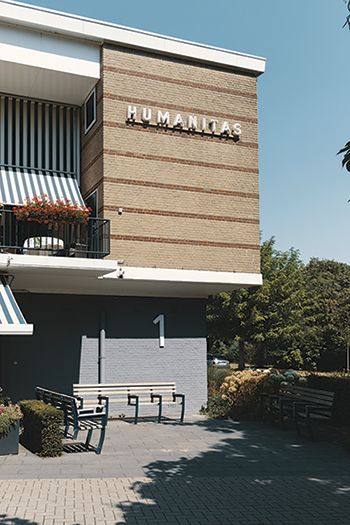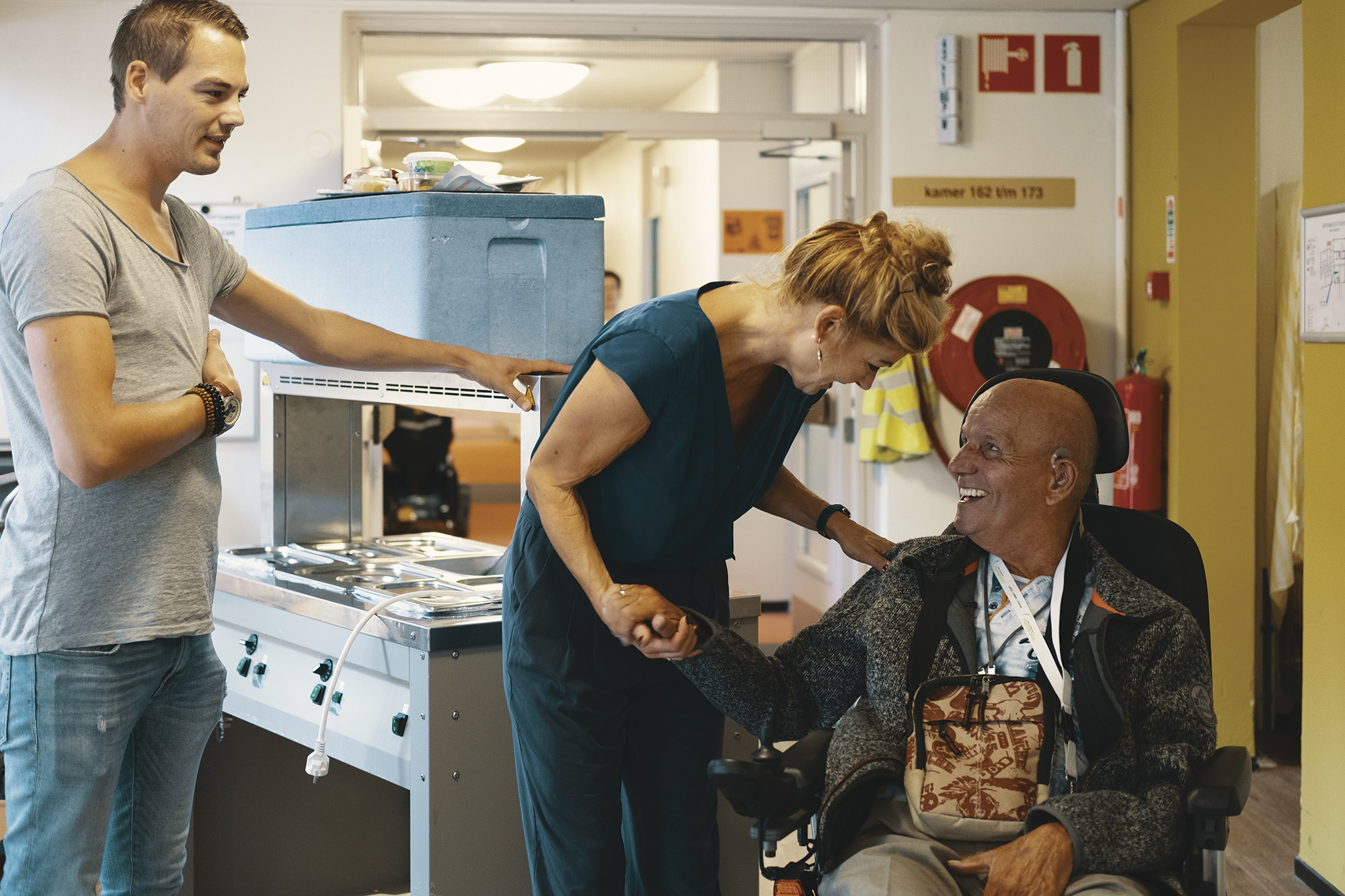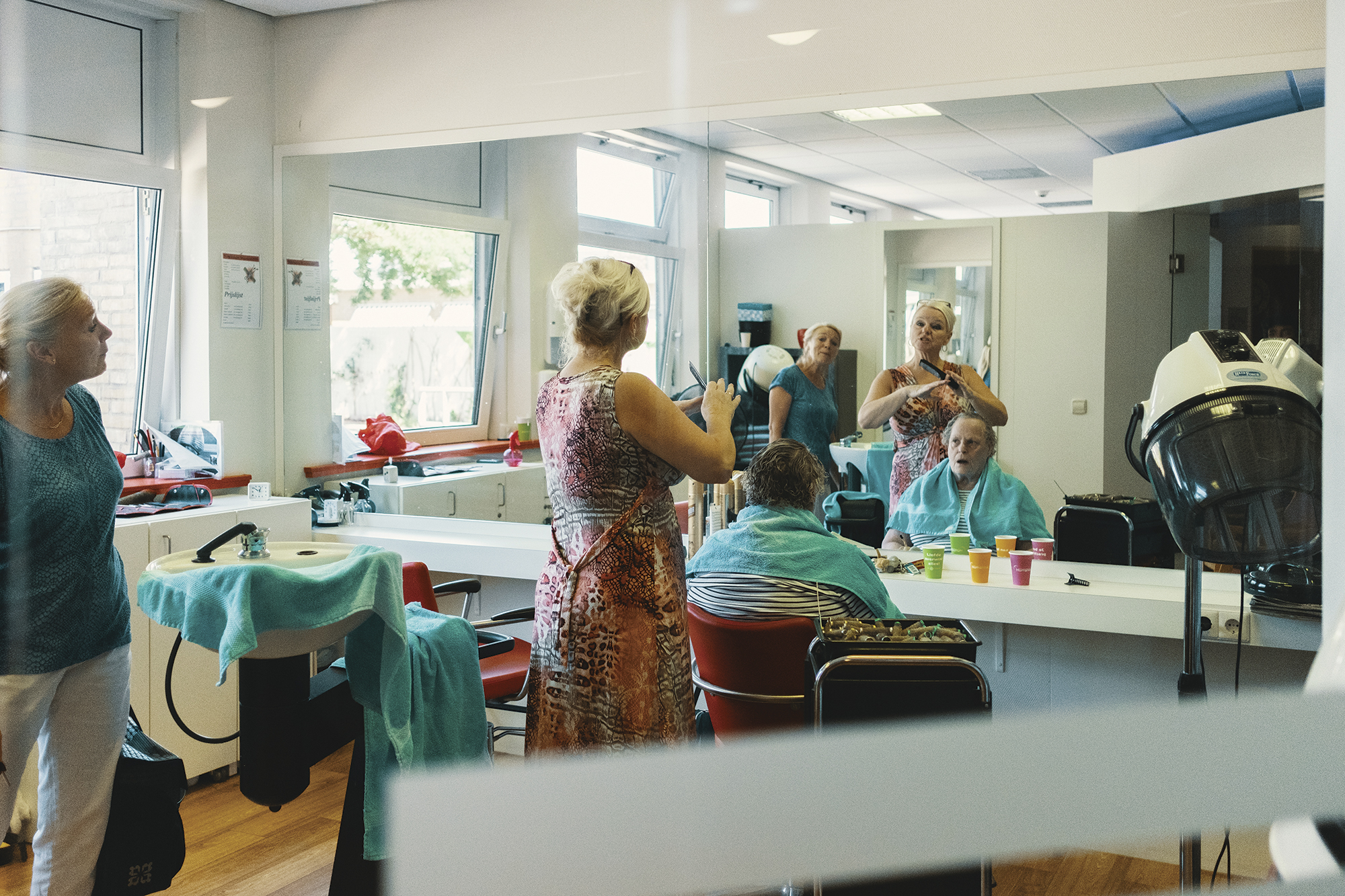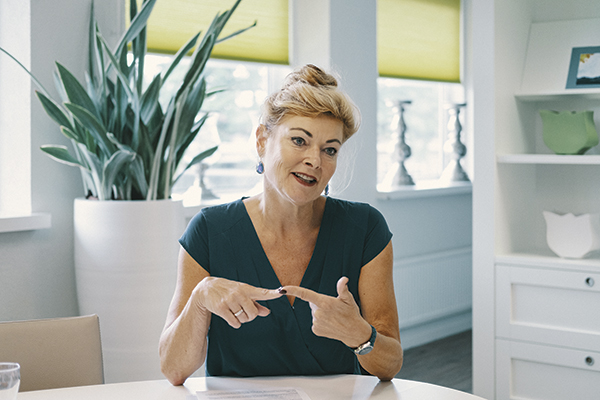- May 31, 2019
- David Everett and Lauren Hassani
The Human Touch at Humanitas

A Rule-Bending Dutch Nursing Home Brings College Students and Seniors Together
DEVENTER, The Netherlands — Whenever Gea Sijpkes wonders whether her innovations are succeeding at the elder care facility she runs, she strolls to the heart of the place, opens her eyes, and listens.
“If you are standing still in the middle of the building, you hear laughter there; you see people smile,” Sijpkes explains. “It’s such a comforting environment.”
This laughter test exemplifies the tradition-trampling, headline-spawning ideas that drive the Humanitas Deventer nursing facility in this riverside city about an hour’s drive from Amsterdam. Sijpkes’ pioneering version of a nursing home relies on a simple but ever-morphing community of love, togetherness, and positivity, plus a sense that the senior residents must help run the facility where they live. So far, the just-try-it attitude has resulted in free apartments for college students who live among the seniors, a thriving arts and performance series that connects seniors with locals, and an adjacent residence for mentally disabled citizens who also interact with the elderly residents. But this living experiment in nursing homes isn’t stopping with those novelties: Sijpke’s latest ideas include what she calls “Alzheimer’s whispering” to provide physical connections for dementia patients and the nurturing of real-life surprises to break seniors’ routines. She is even trying a sort of visit-a-granny program to mentor rudderless children out of cyclical poverty. How’s that for ambition?
For Sijpkes, it all comes back to happiness — that laughter, those smiles. She preaches those goals throughout the Humanitas Deventer facility. “I tell everybody, from the holiday worker and the people who clean the toilets, to the nurses — we are all here for the same purpose, and that is to make people happy, to give them their smile a day.”
The student residents have earned international attention. As an example of Sijpkes’ innovations, the idea is both bold and pragmatic.
When the Dutch government decided in 2012 that it no longer had enough money to provide elder care for everyone over age 80, nursing homes like the Humanitas Deventer facility were facing upheaval. (The age requirement changed to 85, narrowing options for seniors.) Then the strong-willed, rule-bending Sijpkes arrived.

Gea Sijpkes chatting with a resident.
She first thought she could fill the rooms left open by the change with student interns from the local university. But she ran into red tape and too many meetings. Did we mention she doesn’t like rules? So Sijpkes posted a note on the nearest campus wall: Did any students need a free apartment in exchange for 30 hours of volunteer work each month?
The Deventer board didn’t like the idea at first; she had to contend with rules, regulations, and fear of lost insurance coverage. But the first students soon moved in, with six now in residence. They teach everything from typing and social media to graffiti art; they also just become neighbors, like any apartment community. Then real life happens.
Once a night nurse snippily reported that one of the more spirited students had staggered home at four a.m. with two friends, leaving an elevator smelling of alcohol. Such typical young person behavior was atypical for a retirement home. Sijpkes’s reaction to the nurse: “I asked her, ‘Did he bother anybody? No? Okay.”
“In the beginning, I think always people are a bit afraid of new things and not knowing how to react,” Sijpkes observes. “The thing we have done is making things normal again, because it’s normal that students are coming home in the middle of the night.”

Getting a trim at the on-site hair salon.
BELOW: Gea Sijpkes, the fearless leader of Humanitas Deventer, outlines her vision for intergenerational living; and the exterior of the facility, which houses 160 senior residents and 6 university students.
Another time, one of the student residents tried to sneak a date into his apartment by a back stairway. Sijpkes loved it, because she knew the senior residents on that floor would soon be gossiping about the stairway scandal instead of their latest pains. This is the reality she wants — the surprises and challenges of normalcy. The goal is to provoke curiosity, conversation, and memories, not mind-mucking routine.
Sijpkes doesn’t forget the important rules. Fire codes are essential for safety; medical care must be proper. “But if it’s not useful, if it doesn’t contribute to the happiness in the house, to the smile a day, I won’t obey,” she observed. For instance, rules like the annual filing of a government report drive her wacky. Instead of submitting the required paperwork, she got some student interns from the university to prepare a glossy magazine filled with Humanitas stories and photos. Now the Dutch Care Authority cites their report as an example to follow — another indication that the Gospel of Gea is working.
The experiments all focus on people — a fact that seems evident when Sores Duman, a student who has lived at Deventer for more than two years, proudly introduces his friend, Marty Weulink. Marty, who has lived at Deventer for 11 of her past 93 years, laughs and jokes with her neighbor, the older playfully punching the younger in the arm. It’s clear that what makes the Deventer model successful is that the young and old don’t see themselves as fulfilling those adjectives.
Sijpkes knows the students receive far more than free rent. Not only must the younger residents slow down and listen, but they learn how death is part of life as older residents pass on. The same “aging and engaging” motto permeates the daily interaction with autistic residents from next door.
Sijpkes cuts an impressive figure in person, wearing a dark teal jumpsuit and heels that nudge her over the six-foot mark. A loose bun of strawberry blonde hair on top of her head adds to the height. As she moves throughout the facility, distributing jokes and smiles and orchestrating the many moving pieces of a huge nursing home, it’s clear she is adored by residents and coworkers alike. Sijpkes simultaneously exudes a genuine, nurturing disposition and an air of brisk authority. Beneath that warm façade lies an unyielding core.
Her life seems a perfect preparation for Humanitas Deventer. Always strong natured, she grew up in a loving, supportive family that not coincidentally included a social worker father. Sijpkes knew she wanted to add value to peoples’ lives, so she eventually tried nursing. She soon realized that her determination to put patient care above all was going to clash with rules and traditions. She once stood in a doorway to physically block a doctor from entering a sick child’s room because the sleeping child needed rest more than to be awakened by a doctor with a schedule to keep.
The astounded doctor complained to Sijpkes’s boss, but Sijpkes didn’t back down. She also concluded she wasn’t happy in such a controlled environment. She tried business school, earning an MBA while studying government systems, working along the way with the permanently mentally disabled. Her work with that community made her yearn to continuing working with people who need her exact blend of know-how and compassion. Enter the Deventer retirement home, which is part of the nationwide Humanitas network of social service programs in the Netherlands.
Sijpkes’s student resident idea has expanded elsewhere in Holland and Europe, but the concept of joining atypical residents with nursing home residents isn’t unique to Deventer. One elder care facility in Cleveland, Ohio, has housed local art and music students since 2010, and many nursing homes in the US and elsewhere integrate interaction with everything from children to pets. These examples would make perfect sense to Sijpkes, who doesn’t want her ever-innovating Deventer programs simply to be replicated. She plans to create a workbook that preaches a process of determining how senior care communities can be built uniquely and locally, rather than trying to follow a single template.
Sijpkes’s goal is no less than to change the face of senior care. What works with college students in Holland and Cleveland might succeed elsewhere with refugees or unwed mothers. The goal, she believes, should always be happiness and engagement, rather than routine and, well, boredom.

“It’s kind of a movement, a direction in which you can go to reconnect and to make things better for everyone,” Sijpkes says. “You can’t solve it with only the elderly. You have to find new connections in which you can grow together as a heterogeneous community toward new answers and new values, to be happy again.”
She is increasingly taking her ideas worldwide, from Hong Kong to the U.K. to Michigan, where she visited the university in Ann Arbor and immediately noticed the stressful lives of American college students. That fast pace triggered memories of how her seniors back home in Holland were forced to live slower lives. Her rule-bending suggestion reversed the Deventer student resident concept — Michigan, she thought, should move seniors onto each floor of its dorms. That idea isn’t yet in practice, of course, but it demonstrates the nimble mind of this elder care pioneer — a rebel as much as a disruptor.
“We are a living lab,” Sijpkes reflected recently from near the laughing heart of her Deventer operation. “We are alive. Our breath is to keep on developing, keep on moving … Every day is a new day with new chances.” ◆